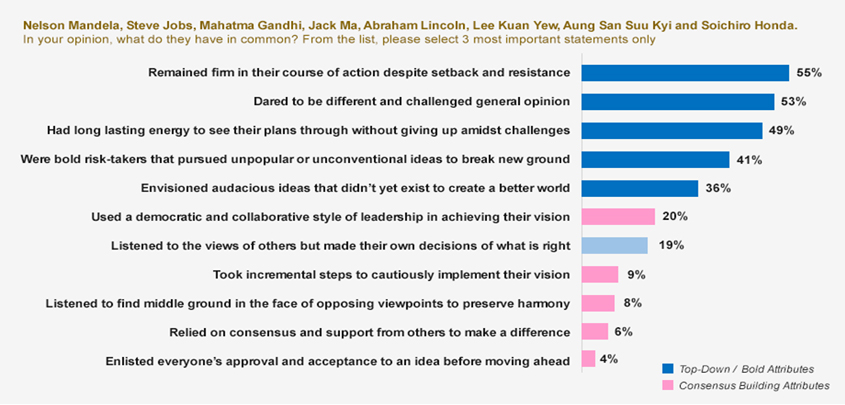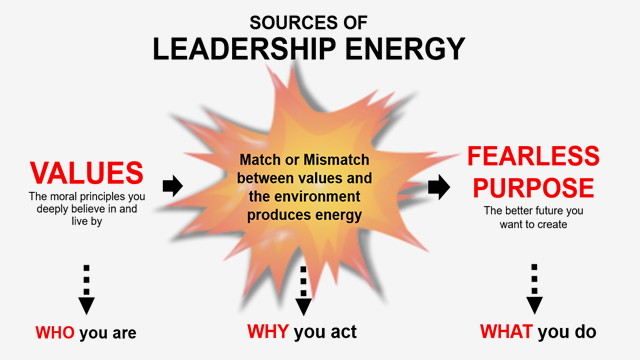What does it take to be an impactful leader in the 21st century?

Leadership & Management
337 week ago — 10 min read
For far too long, we’ve been confusing leadership with followership and with pleasing people. The confusion begins early and goes on through all stages of life.
- Parents love kids that “listen to them” and obey.
- School teachers reward kids that follow their instructions most closely. They don’t like kids that ask too many unnecessary questions that challenge current thinking. A leader in class is one that replicates the taught text and theory as closely as possible in tests and examinations.
- When asked to describe a good leader, most employees paint a picture of someone that gives people what they want, which is not always what they need. Most bosses therefore quickly learn to please – particularly if their leadership behaviour is measured through employee engagement surveys.
- Even in boardrooms when a CEO presents an audacious vision and strategy to create something new, the first question the board asks is – How many have done this before, and what’s the best practice here?
Whichever way you look at it, leadership is confused with pleasing and following. It might be time to recognise that:
- to create positive change, one needs to use a top-down, and even somewhat autocratic style of leadership rather than a democratic, all-inclusive and pleasing style, and
- best practice replication and copying past successful behaviours of others is followership, not leadership.
Sounds terrible and unbelievable? Let me explain…
To set the records straight, I’ve been conducting an experiment in 27 countries. I ask people what these leaders had in common, and from 11 behaviours, to choose the three biggest commonalities.
What do these famous leaders have in common:
- Mahatma Gandhi
- Jack Ma
- Aung San Suu Kyi
- Steve Jobs
- Abraham Lincoln
- Lee Kuan Yew
- Soichiro Honda
- Nelson Mandela
Five of the 11 behaviours are consensus building, all-inclusive and democratic leadership behaviours, five are top-down (my way or the highway) behaviours, and one is a blend of both.
Leadership Attributes: Choose Top 3 Commonalities:
Top-Down / Bold Leadership:
- Dare to be different and willing to challenge general opinion
- Have long lasting energy to see their plans through without giving up amidst challenges
- Be bold risk-takers that pursue unpopular or unconventional ideas to break new ground
- Remain firm in their course of action despite setback and resistance
- Envision audacious ideas that don’t tet exist to create a better world
Consensus Builing / Democratic Leadership:
- Use a democratic and collaborative style of leadership in achieving their vision
- Take incremental steps to cautiously implement their vision
- Listen to find middle ground in the face of opposing view points to preserve harmony
- Rely on counsensus and support from others to make a differencce
- Enlist everyone’s approval and acceptance to an idea before moving ahead
A mix of both:
- Listen to the views of others but make their own decisions of what is right
Guess which ones are showing up as the top three commonalities in country after country in our experiment? Top-down!

Next, I ask respondents to indicate their level of agreement with the statement: In today’s age of breakneck speed, 24/7 connectivity and total transparency, a significant amount of top-down leadership is required to achieve breakthrough results; over 70% agree or strongly agree!
Agreement level – When it comes to achieving breakthrough success for the organisation, a significant amount of top down leadership is required

What this means is that while we claim to love pleasers, in fact we’ve always admired top-down, autocratic leadership. Our data is suggesting that Steve Jobs is perhaps not an anomaly – he may be the rule rather than the exception.
So where does this leave us? Does this mean we now have a 007 licence to kill, and can simply shoot anyone that doesn’t agree with us? No.What it does mean is that today’s age of uber-connectivity is empowering ordinary people like never before, so we cannot use force or position anymore. We need to earn the right to use top-down leadership.
- Why did people listen to Nelson Mandela even though he proposed exactly the opposite of what his people wanted? Most South Africans wanted an eye for an eye, and were thirsty for blood, but upon release from prison, Mandela painted a picture of forgiveness and love.
- Why did the people of Singapore listen to and worship Lee Kuan Yew despite his autocratic style of leadership?
- Why did millions follow Gandhi even though he differed significantly from the popular notion of fighting the British with guns and ammunition?
Because, through their actions, they had each earned the right to use top-down leadership. Deep down, their people trusted them enough to listen to them despite their autocratic behaviour. And none of them used excessive force or position power to enforce their will on people. In fact, Gandhi and Mandela never held positions of power for much of their lives.
So the question now is, how can the right to use top-down autocratic leadership be earned in an era where everyone is free and empowered in today’s 24/7 wired society, where position power is woefully inadequate, and where leaders stand naked in today’s age of total transparency?
To answer the question, we must first understand what leadership really is. We must stop equating it with a position or title, and with following or pleasing. Leadership does not begin with winning an election or with being appointed to a powerful position. It is not about replicating best practices either. What were Mandela, Gandhi and Lee Kuan Yew trying to do? They were trying to create a better future for their people. That is leadership, and it begins when one closes his eyes and vividly imagines and visualises the better future he wants to create for his people.
Of course, there is a huge problem with thinking about life and leadership in this way. Why? Because the moment you visualise a picture of a better future, you are ahead of everyone else, and your constant companion from then on, is resistance, resistance and more resistance. Pleasing would require you to give up on your dream and do what people say, but the key to great leadership is to not give up in the face of such resistance and keep going. So the main ingredient of leadership is not a competency, skill or personality trait, it is to stay the course.
Leadership Energy cannot be learned in business school classrooms through best practice case studies and theoretical models. It must be self-discovered by getting clear about two things – one’s values and purpose.
To uncover limitless energy, one must first become totally clear regarding the set of values that define his identity. Leadership Energy – the reason to act – is produced when one’s values intersect with day-to-day life. One must recognise these intersections and convert the energy into fearless purpose.

This is what Mahatma Gandhi did. He first became crystal clear about his values, which were humility, truth, equality and non-violence. He decided at a very early age that come what may, he would never compromise them. As he became deeply aware of his values, he began to recognise the anger he felt when he saw how people of colour were treated in South Africa, and how Indians were being treated in their own country. Ultimately, the anger became so immense that he converted it into a purpose – that of obtaining independence for India in a non-violent way.
For this purpose, I am prepared to die, but there is no purpose for which I am prepared to kill” – he would often say.
Since his purpose was rooted in a set of deeply held values, he lost fear, and kept going despite increasing resistance and hardship. While he was autocratic about his values and purpose, he remained humble, compassionate and respectful with people. And that is the key to earn the right to use top-down leadership – to be autocratic about values and purpose while still being compassionate and humble with people. It is fully possible to be compassionate and humble while completely disagreeing at the same time.
Lee Kuan Yew said it best: If there is a good reason why it is ‘No,’ then it should remain ‘No,’ but the man must be told politely. You lose nothing by being polite.
This paradoxical duality (of autocracy and humility) is the unique quality that distinguishes the Gandhis, Mandelas and Lee Kuan Yews of the world from ruthless dictators like Stalin, Hitler and Idi Amin.
In summary:
- In the era of breakneck speed, top-down autocratic leadership is needed to create a better future
- Thanks to 24/7 connectivity, ordinary people are more empowered than ever before, and leaders forever exposed and naked.
- Leaders must therefore earn the right to use top down leadership by living their values consistently every day, relentlessly pursuing a values based purpose while still being humble and compassionate at the same time.
Article source: https://iclif.org/articles/naked-autocrats-of-the-21st-century/
To explore business opportunities, link with me by clicking on the 'Invite' button on my eBiz Card.
Disclaimer: The views and opinions expressed in this article are those of the author and do not necessarily reflect the views, official policy or position of GlobalLinker.
Network with SMEs mentioned in this article
View Rajeev 's profile
Other articles written by Rajeev Peshawaria
Let the cream naturally rise to the top
294 week ago
The other duty of corporate governance
300 week ago
Most read this week
Trending
Ecommerce 7 days ago















Comments (3)
Share this content
Please login or Register to join the discussion